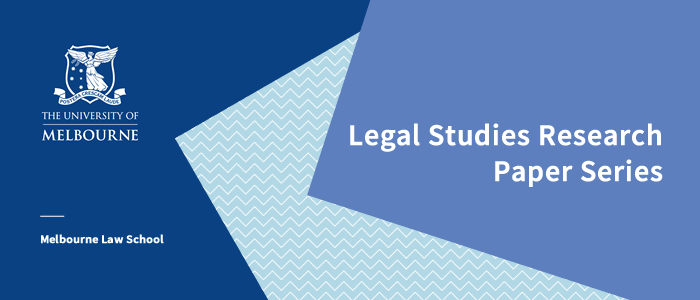Volume 21. No. 6
Wednesday, 18 September 2019

Melbourne Law School published Volume 21 Number 6 of the University of Melbourne Law School Legal Studies Research Paper Series on SSRN.
This issue includes the following articles:
Caron Beaton-Wells
Ten Things to Know About the ACCC's Digital Platforms Inquiry (834)
The Australian Competition and Consumer Commission has completed its landmark inquiry into Digital Platforms and produced a lengthy final report with extensive recommendations to Government. This short note reflects on why the inquiry is considered ground-breaking and crystallises its major findings and recommendations into ten key take-outs as they relate to competition in relevant markets. The analysis finds good reason for the international interest that the inquiry has attracted. The final report confirms a growing global consensus on the dominance of Google and Facebook in online activity. It commits the ACCC to a long term program of capacity-building to meet the competition law enforcement challenges posed by digital markets. However, it takes a cautious approach on regulating for competition. At the same time, the ACCC recommends a suite of regulatory measures to deal with market failures involving asymmetric information and bargaining power affecting consumers and business users.
Margaret Young, Emma Nyhan and Hilary Charlesworth
Studying Country-Specific Engagements with the International Court of Justice (835)
Countries engage with the International Court of Justice as litigants, as participants in advisory proceedings, and less directly, through contributions of nationals as judges or lawyers. A broad range of scholarship within the discipline of public international law examines this engagement. Specific regional experiences are often emphasised and grouped, for example, by western, African or Asian accounts. Yet the nature and extent of scholarship on a single country’s engagement with the Court is less commonly explored. This article surveys scholarly approaches to specific domestic engagement with the ICJ. It focuses on six countries – Australia, France, Nicaragua, Russia, the United Kingdom and the United States – and examines the scholarship generated by each of these countries’ encounters with the Court. This scholarship provides insights into politics, history, institutional practice, professional experience and international legal doctrine. Preliminary in scope, the article points to the value of empirical, historical and country-specific accounts of the work of the ICJ.
Anna Dziedzic and Cheryl Saunders
Constitutional Implementation for Sustainable Peace (836)
Peace agreements made in conflict-affected settings sometimes call for constitutional change. It is obvious enough, in these circumstances, that the establishment and maintenance of peace requires these undertakings to be implemented in the constitutional settlement. The focus of this study is what ‘implementation’ means in this context. In particular, it explores the hypothesis that textual implementation alone is unlikely to be sufficient for sustainable peace and that substantive implementation also is required.
Ying Liew
Proving a Donatio Mortis Causa (837)
This article discusses the precise requirements for establishing a donatio mortis causa. It also considers the practical relationship between such gifts and bequests made by will.
Margaret Young
Fragmentation and International Environmental Law (838)
This article compares two areas of legal regulation with a view to determining the strengths and weaknesses of each as a means of protecting children from misleading advertising. Media regulation, including self-regulatory advertising industry codes, has rules designed to address children’s special vulnerability to advertising, but its application is limited by narrow definitions and concepts that are open to subjective interpretation. Therefore, it places few restrictions, in practice, on the kinds of advertising to which children are exposed. Section 18 of the Australian Consumer Law, by contrast, is broad and comprehensive in its coverage, but does not contain any special provision for children. The article examines the case law on s 18 and determines that there is scope, should an appropriate case arise, for the courts to adopt a test that takes into account children’s cognitive development when determining what is misleading to a young audience. Therefore, consumer law has the potential to serve as a more effective protection for children’s rights and interests as media consumers.
Cheryl Saunders
International Involvement in Constitution Making (839)
International influence is a common feature of constitution making in the 21st century. It comes in a wide variety of forms, involves diverse actors, and applies at multiple points along the spectrum of constitution making, with varying degrees of intensity. The phenomenon is by no means new, although in current conditions of globalisation it may be different in incidence and kind. In at least some forms, international involvement in constitution making is in tension with the theory and practice of constitutions as quintessentially national frameworks for government of a state. A large and growing literature tackles this tension, some defending the nationalist version, but much claiming or assuming the emergence of a new paradigm, whereby national constitutions are an integral part of a global constitutional order. This latter position underpins, whether consciously or not, increasing levels of largely unstructured international involvement in at least some national constitution making projects. This paper explores the tension, from the perspectives of both practice and principle. It argues that neither of the polar positions are persuasive in global terms, necessitating a more coherent framework for the roles and responsibilities of international actors. It suggests that development of the concept of national ownership, sometimes already used rhetorically in connection with international involvement, would be a useful touchstone for the purpose. National ownership for this purpose requires attention to both the process and outcomes of constitution making. From a practical point of view, national ownership has the potential to enhance the effectiveness of constitutions. Emphasis on national ownership also sidesteps at least some of the theoretical problems for legitimacy presented by international involvement although others remain, for resolution either on a global plane or in relation to particular instances of international involvement.